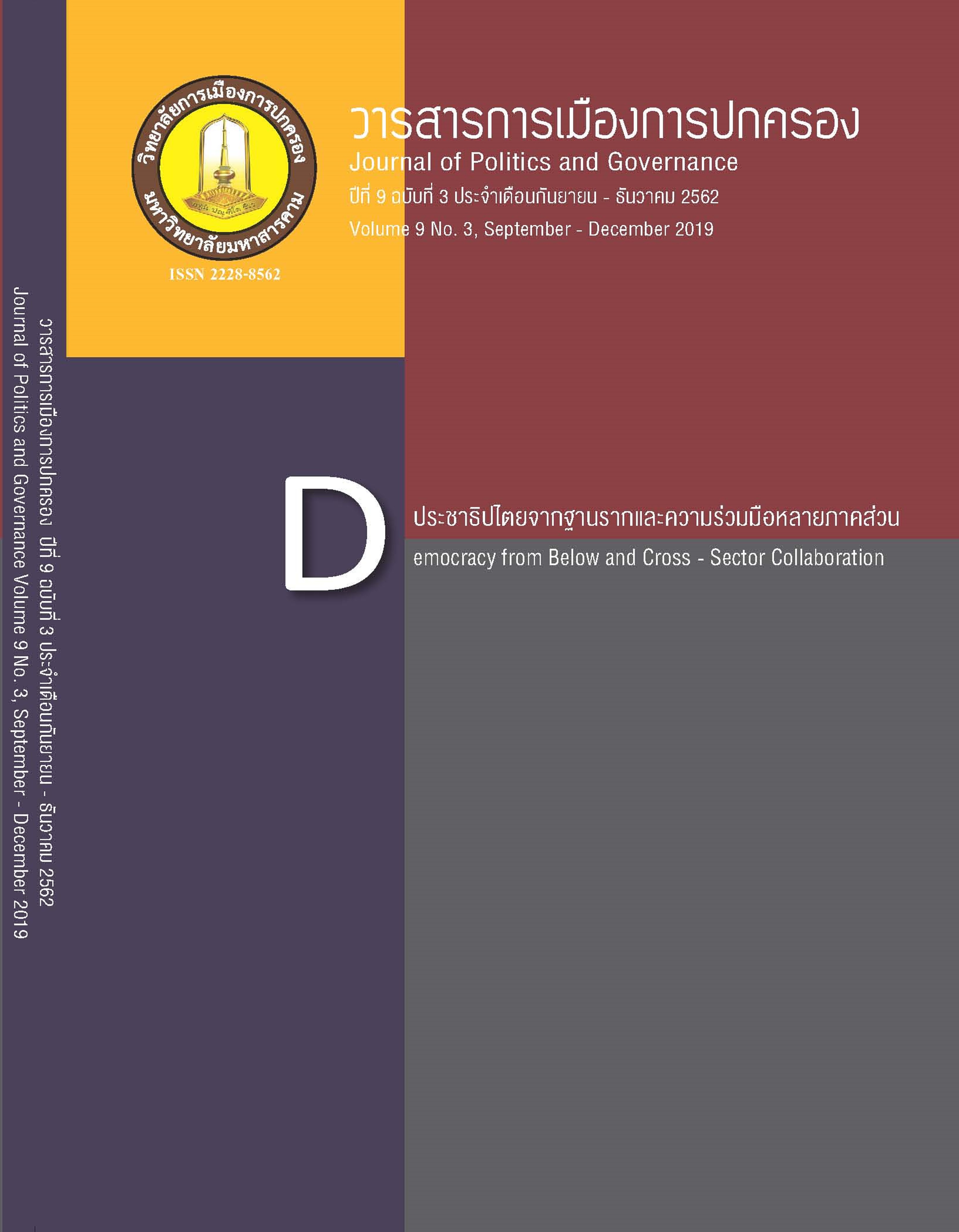Integrating the seniors’ wisdom of the Thai Laos Phutai and Kalerng ethnic groups to the roles of community leaders and social control in Isan Faculty of Cultural Science, Mahasarakham University
Main Article Content
Abstract
Use of ethnic leadership wisdom, ethnic groups of Thai-Laos, Phu-tai and Kalerng has been integrated by community leaders. The objectives of this research were to study: 1) to study the history of local wisdom used among Thai-Lao Phu-tai and Kalerng’s senior family members. 2) The role of leadership and social control of the community Isan Region 3) Integrating the use of traditional wisdom in social control. Approach: The research area in Isan Region included Roi-Et Province, Kalasin Province, and Sakon Nakorn Province. The samples providing information were 90 persons selected by interviewing and Participant Observation. The primary data was subsequently verified by data triangulation and descriptive Statistics techniques. Results: It was found that the background of local seniors’ wisdom of Thai-Lao, Phu-tai and Kalerng ethnic groups is used in several aspects of life, namely earning for a living, herbal treatment, occupation, coexistence, art creativity, rituals led by senior leaders of the community. This also helps with peaceful settlement of disputes. Seniors are still found to play important roles in the community, coping with difficult situations and bringing peace and harmony into families. Ceremonies such as weddings are led by seniors who give blessing and advice to new couples. Use of local wisdom is currently supported by government sectors so it can be passed on to others. Basketry makes a good example of this value. However, ways of the wisdom use has been changed due to economic situations, cultural changes, unemployment, ignorance, poverty, divorcement, arguments, and drug addiction. This also leads to being less respectful to seniors, and lack of knowledge about law makes the people deal with cases and end up with meeting in court. Integrating seniors’ wisdom into leadership is aimed at improving the leaders’ interpersonal and communicative skills. This performance needs co-operation from members in the society. Conclusion/Recommendations: The study revealed that integration of seniors’ wisdom into leadership benefits the communities with peaceful settlement of disputes, justice, equality, local wisdom, and how to exchange one’s own wisdom with others’ before learning to integrate it into their work for the ultimate in prosperity of the society.
Article Details
References
กวี วงศ์พุฒ. (2536). ภาวะผู้นำ. กรุงเทพฯ : ศูนย์ส่งเสริมวิชาชีพบัญชี พิมพ์ครั้งที่ 3.
กุลวิตรา ภังคานนท์. (2531). นานาทัศนะเกี่ยวกับ “ ภูมิปัญญาท้องถิ่น”. วารสารการศึกษาแห่งชาติ, 24(1). (สิงหาคม – กันยายน).
ฆัสรา ขมะวรรณ. (2537). แนวความคิดของ เรย์มอนด์ วิลเลี่ยมในวัฒนธรรมศึกษาและการวิเคราะห์วัฒนธรรมบริโภค. วิทยานิพนธ์ สค.ม. กรุงเทพฯ : มหาวิทยาลัยธรรมศาสตร์.
ชอบ ดีสวนโคก. (2547). เจ้าโคตรระบบอาวุโสอีสาน. มหาวิทยาลัยมหาสารคาม.
ทรงคุณ จันทจร. (2553). การถ่ายทอดภูมิปัญญาพื้นบ้านในเรื่องทรัพยากรดิน น้ำ ป่าไม้ของกลุ่มชาติพันธุ์กะเลิง. มหาสารคาม : คณะวัฒนธรรมศาสตร์มหาวิทยาลัยมหาสารคาม.
บุญตา ส.ผาบมีชัย. (2547). กระบวนการว่าด้วยการไกล่เกลี่ยข้อพิพาท: ศึกษาเปรียบเทียบตามกฎหมายไทยและสาธารณประชาธิปไตยประชาชนลาว. วิทยานิพนธ์นิติศาสตร์มหาบัณฑิต. กรุงเทพฯ : มหาวิทยาลัยธรรมศาตร์.
ถวิล เกสรราช. (2512). ประวัติผู้ไทย. กรุงเทพฯ : กรุงสยามการพิมพ์.
นิคม กองเพชร. (2553). บทบาทของพอล่าม : ความปรองดองพื้นฐานในชีวิตสมรสของชาวผู้ไท.วิทยานิพนธ์ ปร.ด. มหาสารคาม : มหาวิทยาลัยมหาสารคาม.
พจนารถ กรึงไกร.(2545). การมีส่วนร่วมขององค์กรปกครองส่วนท้องถิ่นกับชุมชนในการจัดการแหล่งท่องเที่ยวเชิงนิเวศและวัฒนธรรม : กรณีศึกษา ตำบลโป่งงาม อำเภอแม่สายจังหวัดเชียงราย. วิทยานิพนธ์ ศศ.ม.(พัฒนาสังคม). เชียงใหม่ : มหาวิทยาลัยเชียงใหม่.
พระอธิพันธ์ อภิปุณฺโณและ. ศึกษาเปรียบเทียบรูปแบบการไกล่เกลี่ยเชิงพุทธกับระบบเจ้าโคตร.วารสารสันติศึกษาปริทรรศน์ มจร, 5(ฉบับพิเศษ).
ไพฑูรย์ มีกุศล. (2550). แนวคิดและแนวทางในการศึกษาภูมิปัญญาท้องถิ่น. วารสารสุโขทัยธรรมาธิราช. 1(2), กรกฎาคม –ธันวาคม,
ยุค ศรีอาริยะ. (2545). ภูมิปัญญาบูรณาการ. กรุงเทพฯ : อมรินทร์บุคเซ็นเตอร์.
ศิริพงษ์ นวลแก้ว. (2542). การนำภูมิปัญญาชุมชน ยาชุดวิเศษในการพัฒนา. วารสารวัฒนธรรมไทย, 36(5). มิถุนายน
สมชาย วรรณลุ. (2551). การประยุกต์ใช้ภูมิปัญญาของชาวอีสานในการระงับข้อพิพาททางสังคม. วิทยานิพนธ์ ปร.ด. สาขาวัฒนธรรมศาสตร์ มหาสารคาม : มหาวิทยาลัยมหาสารคาม.
สมศักดิ์ จังตระกุล. (2554). การจัดการความขัดแย้งโดยนายอำเภอของประชาชนในประเทศไทย. นครปฐม: วิทยานิพนธ์ ปรัชญาดุษฎีบัณฑิต สาขาวิชาการจัดการภาครัฐและเอกชน บัณฑิตวิทยาลัย มหาวิทยาลัยคริสเตียน.
สุพจน์ ประเสริฐศรี. (2527). การศึกษาและวัฒนธรรมของอีสานใต้. การศึกษาแห่งชาติ.
สุรจิตต์ จันทรสาขา. (2543). เมืองมุกดาหารและจังหวัดมุกดาหาร. มุกดาหาร : สภาวัฒนธรรมจังหวัดมุกดาหาร.
อรทัย ศรีทองธรรม. (2539). วัฒนธรรมความเชื่อของหมู่บ้านอีสานในการอนุรักษ์ป่าชุมชน กรณีศึกษาหมู่บ้านในอำเภอเดชอุดม จังหวัดอุบลราชธานี. กรุงเทพฯ : บัณฑิตวิทยาลัย มหาวิทยาลัยมหิดล.
Ashley, Dominic Tarlton.(1995). Bureaucratic Barriers and Constraints to the Utilization of Indigenous knowledge in Sustainable Agriculturre in Sierra Leone. Madison : The University of Wisconsin- Madison.
The Black, Guy. (1989). The Application of system analysis to Government Operation. Washington D.C. : National Institute of Washington.
Lebars, Frank. M. and Others. (2001).Ethnic Group of Main and Southeast Asia. New Haven. Human Relations Area Files Press.


